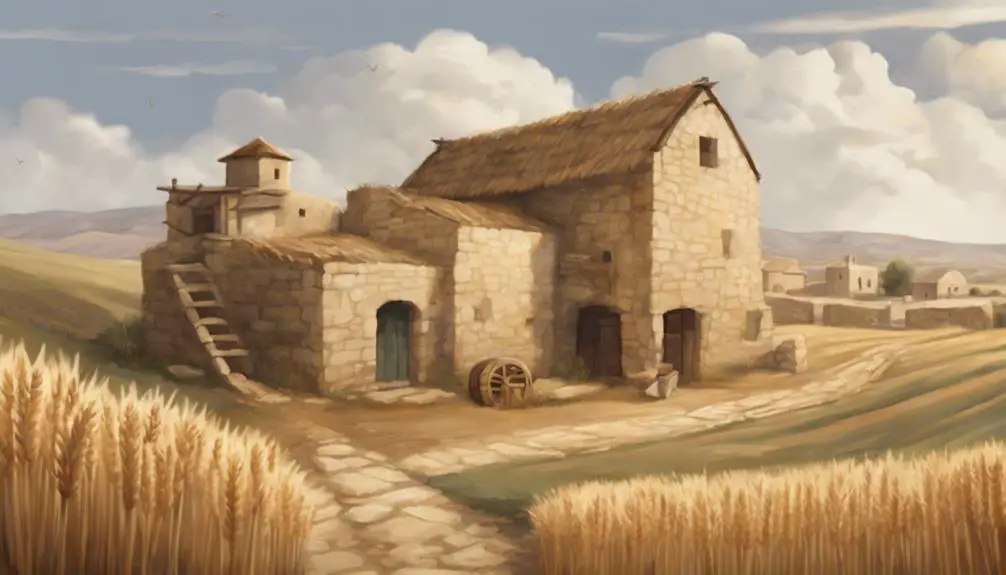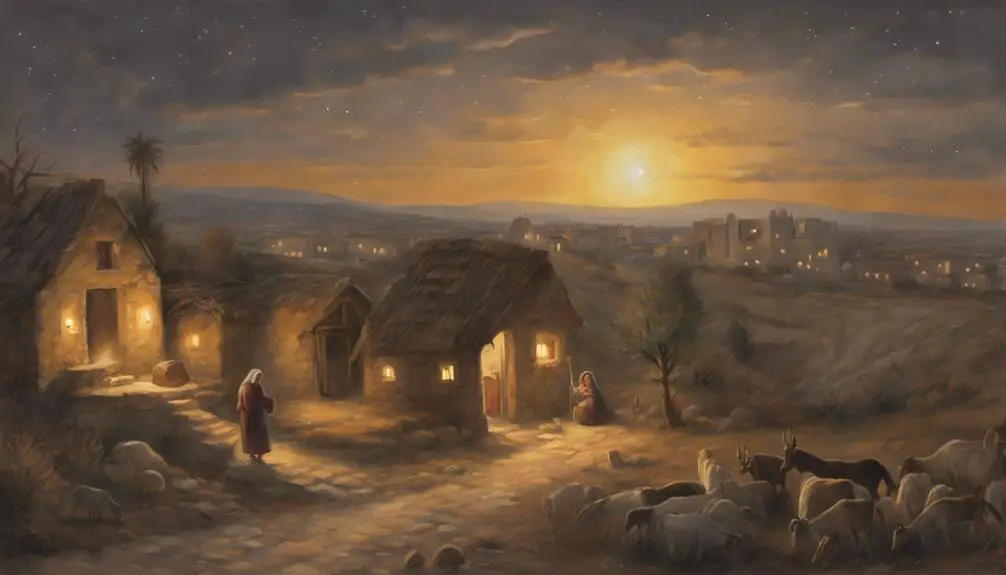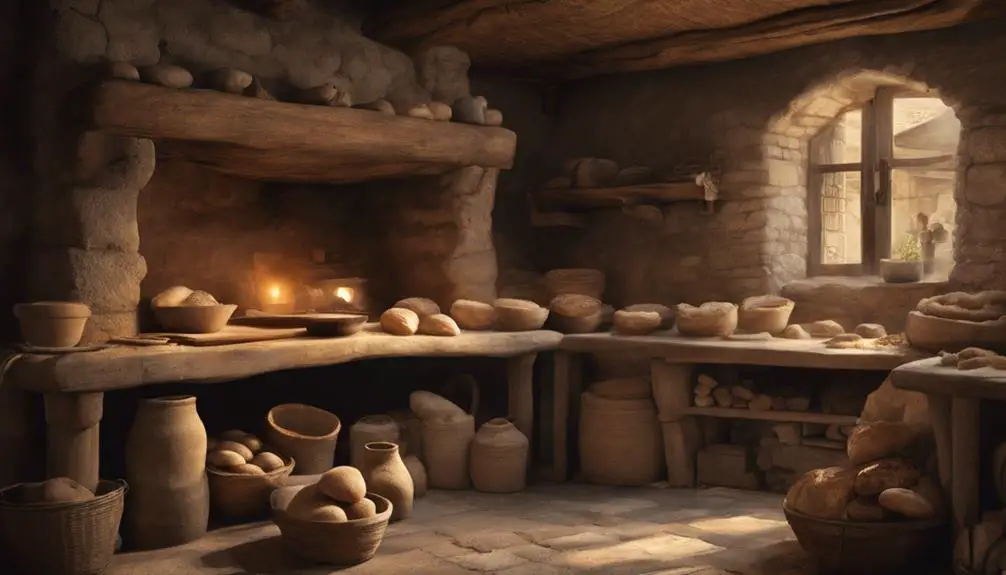Kingmakers and divine providence intertwine in Bethlehem, the 'House of Bread', a place steeped in biblical history and spiritual significance.

House of Bread in the Bible
Imagine standing in a bakery, the smell of fresh bread wafting around you. Now, translate that feeling into a place – Bethlehem, a name that literally means 'House of Bread' in Hebrew.
In the Bible, Bethlehem isn't just a geographical location; it's a town rich with spiritual significance, a birthplace of kings, and a site of divine providence. But what does it mean to call it the 'House of Bread'? And how does this metaphor permeate the layers of biblical narratives?
Let's unravel this together.
Key Takeaways
- Bethlehem, meaning 'House of Bread', symbolizes agricultural richness and spiritual nourishment.
- Biblical narratives like Ruth's journey and David's kingship highlight Bethlehem's significance.
- The 'House of Bread' foreshadows Jesus Christ, the 'Bread of Life', providing spiritual sustenance.
- Modern interpretations continue to recognize Bethlehem's impact on faith and the symbolism of bread in spiritual teachings.
Bethlehem's Historical Background

Delving into the historical background of Bethlehem, you'll find this ancient city holds an important place in biblical narratives, its name literally translating to 'House of Bread' in Hebrew, reflecting the agricultural richness of the region. A city steeped in antiquity, Bethlehem's ancient architecture bears testimony to its rich cultural heritage, showing influences from various civilizations that have left their mark over the centuries.
You can't help but be captivated by the unique blend of architectural styles, reflecting the city's complex history. The Canaanite period introduced fortification walls, while the Roman influence is evident in the public buildings and roads. Byzantine elements shine through in the churches, with the Church of the Nativity being a prime example.
Cultural influences also shaped Bethlehem's landscape. The city was a melting pot of traditions, with Hebrew, Canaanite, Roman, and Byzantine cultures each contributing their unique elements. This cultural amalgamation has helped shape Bethlehem's identity, making it an intriguing place of interest for historians, theologians, and archaeologists alike.
Thus, Bethlehem, the 'House of Bread', isn't just significant for its biblical references but also for its ancient architecture and cultural influences that continue to echo through the ages.
Biblical Narratives Involving Bethlehem

Transitioning from the historical and architectural nuances of Bethlehem, it's crucial to explore the biblical narratives that prominently feature this 'House of Bread'. You'll find Bethlehem explicitly woven into stories of profound theological significance.
Firstly, 'Ruth's Journey' originates in this town. Ruth, a Moabite woman, arrives in Bethlehem during the barley harvest, embodying the town's epithet as the 'House of Bread'. Her story, one of faith and resilience, is directly linked with Bethlehem.
Secondly, the 'David's Ancestry' narrative is rooted in Bethlehem. David, who was anointed king, was a Bethlehemite, emphasizing the town's importance in Israel's royal lineage.
To explore the biblical narratives involving Bethlehem, consider the following bullet points:
- Ruth's unwavering faith leading her to Bethlehem, where she marries Boaz and becomes an ancestor of King David.
- David, a shepherd from Bethlehem, becoming Israel's greatest king.
- The prophecy in Micah 5:2, foretelling the Messiah's birth in Bethlehem.
Each narrative adds depth to Bethlehem's biblical significance, beyond its historical and architectural aspects. The town's rich biblical narratives intertwine with its physical attributes to create a comprehensive picture of this 'House of Bread'.
Symbolic Significance of 'House of Bread

While you've been exploring the biblical narratives associated with Bethlehem, the 'House of Bread', have you ever pondered its symbolic significance? The term 'House of Bread' is not merely a geographical indication but a profound metaphor.
Symbol |
Significance |
|---|---|
House |
A place of dwelling, safety, and communion |
Bread |
A symbol of life-sustaining provisions |
House of Bread |
A source of spiritual nourishment |
Bethlehem |
The birthplace of Jesus Christ, the 'Bread of Life' |
Spiritual Significance |
Bethlehem offers the Bread of Life, Jesus Christ |
In bread symbolism, bread is not merely a physical food but represents spiritual nourishment, which is essential for the sustenance of your soul. Just as physical bread nourishes your body, the spiritual Bread of Life feeds your spirit, providing the sustenance and strength necessary for spiritual growth and maturity.
Bethlehem's status as the 'House of Bread' emphasizes its role in the divine plan. It's where God chose to send His Son, the ultimate spiritual nourishment. In essence, the 'House of Bread' symbolizes God's provision, love, and care for humanity.
Bread in Biblical Teachings

Let's uncover the multifaceted role of bread in biblical teachings, where it often emerges not only as a simple sustenance but also as a powerful spiritual metaphor. The Bible uses Bread Metaphors in numerous contexts, revealing deeper spiritual truths and illustrating broader theological principles.
In this context, consider the following three examples:
- Jesus refers to Himself as the 'Bread of Life' in the Gospel of John (John 6:35), suggesting that just as bread sustains physical life, He provides spiritual sustenance.
- The Last Supper presents bread as a symbol of Christ's body, broken for humanity's salvation. This Eucharistic Symbolism is a foundational aspect of Christian worship.
- The story of the Israelites receiving 'manna' from heaven in Exodus (Exodus 16:4) signifies God's providential care and sustenance.
These instances demonstrate how bread, far from being a mere dietary staple, assumes profound symbolic significance in biblical narratives. It serves to underscore divine provision, embody Christ's self-sacrifice, and illuminate the pathway to eternal life. As you delve deeper into the biblical text, you'll discover that the humble loaf serves as a powerful lens through which to view God's salvific work in the world.
Modern Interpretations and Impact

In considering the biblical significance of bread, you might now find it intriguing to explore how these ancient metaphors continue to shape contemporary interpretations and influence modern spiritual practices. Bread, a staple of life and a symbol of God's provision, is deeply woven into the fabric of Contemporary Faith.
As you delve into Scripture Analysis, you'll notice that bread's symbolism extends beyond physical sustenance, representing spiritual nourishment. It's a concept that resonates profoundly with believers today, reminding them of their dependence on God for spiritual sustenance, just as they rely on bread for physical nourishment.
Jesus' declaration as the 'Bread of Life' in the New Testament has been reinterpreted in many ways, impacting modern theological thought and worship. The Eucharist, a central sacrament in many Christian denominations, exemplifies this impact. It symbolizes Jesus' body, broken like bread, for the sake of humanity. It's a powerful image that reinforces our spiritual need and God's gracious provision.
The 'House of Bread,' Bethlehem, further underscores this symbolism. As the birthplace of Jesus, it's seen as the place where spiritual nourishment was born into the world, a concept that continues to inspire and shape contemporary faith.
Frequently Asked Questions
What Are Other Biblical Locations Associated With Bread?
You may be familiar with bread's significance in biblical parables and its metaphorical usage in the Bible. For instance, Jesus feeds the multitudes with loaves in Galilee.
Then there's the Last Supper in Jerusalem, where bread symbolizes Jesus's body. These locations, among others, emphasize the importance of bread in biblical teachings, symbolizing sustenance, community, and divine providence.
Have Any Important Archaeological Finds Been Made in Bethlehem That Relate to Bread Production or Consumption?
You're likely wondering about the archaeological discoveries in Bethlehem, specifically those related to bread. While there's evidence of ancient grains used in bread-making, specific finds pointing to 'Bethlehem Bakeries' are limited.
Excavations have revealed tools and ovens, but not exclusive to bread production. It's clear Bethlehem had a rich agricultural history, but directly linking archaeological finds to bread is a complex task.
Research continues in this intriguing area of biblical archaeology.
How Has Bread Been Used as a Symbol in Other Religious Texts Outside of the Bible?
In other religious texts outside of the Bible, bread is also symbolically significant.
For instance, in Buddhism, bread signifies the necessity of physical nourishment for spiritual growth.
Meanwhile, the Quran uses bread metaphors to depict sustenance and God's providence.
Both texts use bread as a symbol to relay deep theological messages about life's essential needs and divine provision.
Hence, you see bread's symbolism extending beyond the Bible's context.
What Role Does Bread Play in Contemporary Christian Practices and Ceremonies?
In contemporary Christian practices, bread holds significant symbolism. It's central to Eucharistic practices where you partake in the 'Lord's Supper.' Here, bread represents Jesus' body, given for you.
It's a profound reminder of Jesus' sacrifice and your participation in His divine life. This bread symbolism, deeply embedded in Christian ceremonies, fosters a sense of unity, grace, and gratitude, reinforcing your bond with the divine.
Are There Any Specific Prayers or Hymns in the Bible That Reference the 'House of Bread'?
You're curious about prayers or hymns referencing 'house of bread.'
Well, the Bible uses bread symbolism extensively, but it's not directly tied to the term 'house of bread' in prayers or hymns.
Bread often symbolizes God's provision, and it's central in Biblical feasts.
Remember, the Last Supper? Christ's body was represented by bread.
Conclusion
So, you've journeyed through Bethlehem's rich history, viewed its prominent role in biblical narratives, and pondered upon its symbolic meaning as the 'House of Bread'.
You've reflected on the significance of bread in biblical teachings, and weighed modern interpretations and impacts.
Now, as you move forward, let Bethlehem's narrative serve as a reminder of God's provision, symbolized by bread, and the transformative power of His divine plan.



Sign up